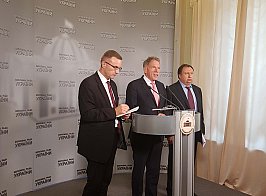International activity
Ivanna Klympush-Tsintsadze: “We must do everything we can to achieve the opening of membership negotiations with the EU by the end of this year”

The Chair of the Committee on Ukraine’s Integration into the EU, Ivanna
Klympush-Tsintsadze, took part in the webinar “European integration,
full-scale invasion of the Russian Federation: the role of the Ukrainian
diaspora in fighting and overcoming challenges and threats”.
Ivanna Klympush-Tsintsadze noted that representatives of the diaspora can
help Ukraine in the countries where they live. They can better communicate
events in Ukraine and Ukraine's needs, considering historical and cultural
differences, which may not always be taken into account by representatives
of Ukrainian politics or civil society.
The Chair of the Committee reminded that Russia’s full-scale invasion
significantly changed the mood inside Ukraine. Even Russia’s supporters
finally saw its real face. Responding to Ukrainian society, the
authorities applied for Ukraine's EU membership. “From the beginning of
the full-scale invasion, we actively engaged not only in advocacy and
attracting military assistance, but also in the work concerning granting
Ukraine a candidate status”, said Ivanna Klympush-Tsintsadze.
She stated that obtaining the candidate status for joining the EU is a
great merit of the Defence Forces, Ukrainian society and united efforts at
all levels of the Ukrainian government representing the entire political
spectrum. Seven conditions for Ukraine accompanied this status.
“Unfortunately, at the end of December last year and at the beginning of
January this year, the Chairs of the Parliament and the Government assured
that the Parliament and the Government had already done everything
depending on them to fulfil these seven conditions”, Ivanna
Klympush-Tsintsadze said. In June, Ukraine received an intermediate
assessment from the European Commission. And it turned out that Ukraine
fulfilled only two of the seven conditions. At the same time, according to
her, Ukraine has a unique chance to receive a mostly positive assessment
and recommendation from the European Commission for the opening of
membership negotiations by the end of this year. “I see this as a window
of opportunity for Ukraine because 2024 will be the year of elections to
the European Parliament, which will shift attention to other processes. It
will be more and more difficult for Ukraine to make its way to the top of
the agenda”, said the Chair of the Committee.
As for the role of the diaspora in supporting Ukraine, there are several
important directions here, according to Ivanna Klympush-Tsintsadze. This
is the advocacy of military aid to Ukraine. Interaction with local
politicians regarding their position on supporting Ukraine. And the
everyday efforts of explaining to people what is happening in Ukraine, why
the war is going on, and why forcing Ukraine to peace on Putin's terms
would be a catastrophic mistake. Therefore, an important task is
disseminating information through personal stories. “We are very much
counting on diaspora organisations and politically active Ukrainians to
get involved here”, concluded the Chair of the Committee.

